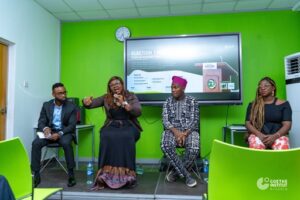Spaces for Change | S4C took part in a panel discussion organized by Goethe Institute to analyze Nigeria’s political climate in the aftermath of the 2023 presidential election. One of the significant highlights of the election was the surge in youth political participation attributed to various factors such as the #ENDSARS protest in 2020, the 8-month university strike in 2022, and a string of oppressive presidential orders, including the 7-month Twitter Ban in 2021. The discussion panel held on the 3rd of March 2023 had a balanced mix of media personnel, young political aspirants, political analysts, and civil society. Attendees include activists, students, diplomats, artists, academics, cartoonists, donor representatives, and media practitioners.
One issue that dominated the discussions was the introduction of digital technologies into the electoral process. The new electoral law introduced the Bimodal Voter Accreditation System (BVAS) and the Independent National Electoral Commission’s (INEC’s) Result Viewing Portal (IReV) to enhance the credibility of the elections and shore up voter confidence in INEC. BVAS accredits voters either through thumbprint or facial recognition technologies. This discussion was prompted by the events that played out during the election, including disruption, ballot snatching, voter intimidation, and INEC’s refusal or inability to use BVAS to upload the presidential election results on the IReV portal contrary to the new electoral law. The conversation also delved into the organic emergence of a third powerful opposition, which gave hope for a new political order.
Assessing the extent of youth involvement in the current political dispensation, panelists observed that despite the surge in registered voters, less than half of them came out to vote suggesting that social media enthusiasm may not always translate into action. Recognizing enthusiasm and exuberance as important first steps towards political consciousness, S4C contended that everyone has a role to play in nation-building whether as intellectuals or enthusiasts, or political office holders. Regardless of the electoral outcomes, a new era of political consciousness and reform of the electoral architecture has already begun.
The panel discussion was preceded by a cartoon exhibition, showing a variety of drawings and artworks that either mimic or evoke comical emotions about the current political climate in the country. The exhibition, organized by the Cartoonist Association of Nigeria, presented satirical expressions of socio-political issues within Nigeria, with a particular focus on the 2023 elections and the major political contenders. The exhibition, followed by the panel discussion, were preludes to the launch of a book titled “NIGERIA’S FOURTH REPUBLIC, 1999-2021: A MILITARISED DEMOCRACY” by Dr. Michael Nwakpa, the founding director of the Centre for African Conflict & Development in London, UK.
Dr. Michael Nwakpa’s new book examines Nigeria’s fourth republic, which is the country’s longest-running democratic era since gaining independence from Britain in 1960. The book argues that, despite three successful democratic transitions of power for more than two decades, democracy in Nigeria is still predominantly militarized. The book offers insights into the infusion of militaristic ideologies into the country’s political, socio-economic, and security fabric. Goethe-Institut is the Federal Republic of Germany’s cultural institute responsible for promoting the study of German abroad and encouraging international cultural exchange.





















